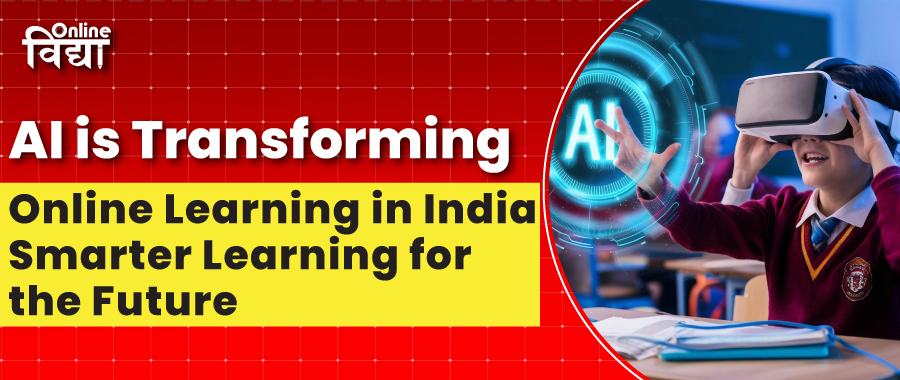Specializations
Courses Available
Courses

AI is Transforming Online Learning in India | Smarter Learning for the Future
AI is Transforming Online Learning in India | Smarter Learning for the Future,May 24, 2025
Information
May 24, 2025
1182 Views
- Share:
Artificial Intelligence (AI) is at the forefront of India's digital revolution in the educational sector. AI-based online education is making quality education more effective, personalized, and accessible than ever before, whether in densely populated cities or remote villages. It is clear that artificial intelligence (AI) is not just a technological innovation—it is a game-changer for millions of teachers and students across the country, as the nation's online education market is projected to grow by over $2 billion by 2025.
The Rise of AI in Online Learning
The development of e-learning in India has been prompted by the expansion of internet connectivity and increasing demand for flexible education.
How AI is Revolutionizing Distance Learning
1. Personalized Education Pathways
Mostly in a country as multicultural as India, old-fashioned classrooms often struggle to fulfill the unique needs of each learner. That is changed by AI, which develops customized learning pathways by analyzing each student's performance, talents, and areas of weakness. Each student can learn at their own pace and manner through adaptive learning technology, which also determines resources, adjusts the complexity of the material, and provides customized feedback.
2. Intelligent Tutoring and Round-the-Clock Support
Virtual instructors and chatbots are available 24/7 to help students understand difficult topics, answer questions, or clear doubts. Instant feedback and various explanations given by such systems help fill the vacuum created by a lack of face-to-face instruction in virtual classrooms, thus increasing engagement and responsiveness.
3. Real-Time Analytics and Adaptive Assessments
AI-powered testing sites offer each user a unique test set: the more a student performs well, the more challenges the students are presented with; the worse a student performs, the more assistance or guidance is provided. Teachers using real-time analytics to identify gaps in learning, track student progress, and intervene early when students need assistance result in better outcomes and reduced drop-out rates.
4. Motivation through Gamification
To tackle the disadvantage of interest in distance education, AI promotes gamification. It consists of game elements like leaderboards, badges, and rewards. These encourage students to persevere in accomplishing set goals and, at the same time, have fun learning.
5. Administrative Institutional Processes
Complex administrative tasks must be carried out in an automated manner so that teachers may concentrate on instruction and mentoring. It is through automated grading that real-time feedback is offered, and through advanced scheduling tools that effective course management is achieved.
Impact in the Real World: Case Studies
Personalized Math Instruction: When math is taught according to an individual's way of learning or through custom-made program content, student interest and performance are highly enhanced by AI systems like Maths Pathway.
Early Intervention: AI systems in schools detect students at an early risk so that targeted treatments can be implemented, as failure rates could be tremendously reduced, and retention levels are maximized.
Flexible Course Design: AI is used by institutions to create flexible learning pathways that boost learning outcomes and enhance student engagement.
Students' Challenges for the Future
With the advent of machine learning, AI-based predictive analytics, and immersive technologies such as virtual and augmented reality, the Indian online education scene remains bright. However, there are some challenges:
- The "digital divide" has been established to give AI-facilitated learning to the disadvantaged and rural masses.
- Teacher training is concerned with the capability of teachers in using AI tools while interpreting data-driven insights.
- Data privacy consists of maintaining the student data while observing ethical considerations in the use of AI.
However, the undeniable advantages put AI at the forefront of democratizing education by increasing coverage area, efficiency, and student orientation.
Frequently Asked Questions
Q1: How can AI help Indian students with online learning?
Since AI can personalize the syllabus, exams, and feedback concerning an independent learning style or approach and strengths and weaknesses of a particular student, the student then has the liberty of learning at his/her pace and style.
Q2: Are AI-based online teaching courses equivalent to traditional teaching in schools?
Increased effectiveness may be guaranteed using AI, such as in providing real-time feedback, adaptive testing, and coaching. However, the best outcomes usually occur when AI-assisted learning is made interactive and combines face-to-face human instructions.
Q3: In what ways can AI assist teachers in online courses?
By automating administrative tasks, AI frees up teachers to engage in talent development and mentoring activities. AI also provides useful information on student performance.
Q4: What can be considered major impediments to AI implementation in Indian online learning?
Addressing the digital divide, teacher preparedness, and a huge privacy firewall for student data are the major challenges. Overcoming these could pave the way for the enhanced implementation of AI.

Meet Our Counselling Experts
Get 100% Free Career Counseling




PlacementPartners










Schedule Your 30 min Couselling Session With Today!!
Select a Date of your choice :
You Have Selected Slot on .

